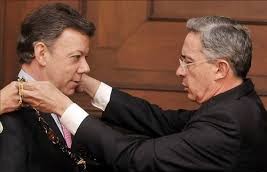Colombia-Venezuela Relations: What Are the Prospects?
Colombia and Venezuela have a history of rocky relations characterized by short bursts of improvement and deterioration.
When Juan Manuel Santos became president of Colombia in August 2010, it was clear he had one overriding aim: to end his country’s longstanding internal armed conflict, chiefly with the Revolutionary Armed Forces of Colombia (FARC). Re-elected to a second term last June, Santos now appears to be in the final stretch toward reaching a peace agreement with the FARC. Talks in Havana between government negotiators and FARC leadership have advanced enough for some victims of the conflict and an array of military officials to have joined the negotiations.
In addition, Santos managed to get the United States to name a special envoy to lend public support to his peace initiative, and most recently he set up a high-level Advisory Commission for Peace that includes former President Andres Pastrana, along with members of the center-left opposition. Though the negotiations, which formally began in October 2012, have taken longer than Santos initially announced, the pace has recently accelerated amid high expectations. The FARC’s declaration of a unilateral cease-fire in December 2014 contributed to this momentum.
Colombia and Venezuela have a history of rocky relations characterized by short bursts of improvement and deterioration.
On August 7, an important chapter in Colombian-Venezuelan relations that has coincided with the presidencies of Alvaro Uribe and Hugo Chavez will come to an end. These last eight years have been a rollercoaster, with moments of great tension but also occasional pragmatism.
While Santos is familiar with Chávez’s unpredictability and knows as well as anyone where the FARC rebels are and what they are up to, he also knows the economic stakes for Colombia.
 Globovisión / CC BY-NC 2.0
Globovisión / CC BY-NC 2.0